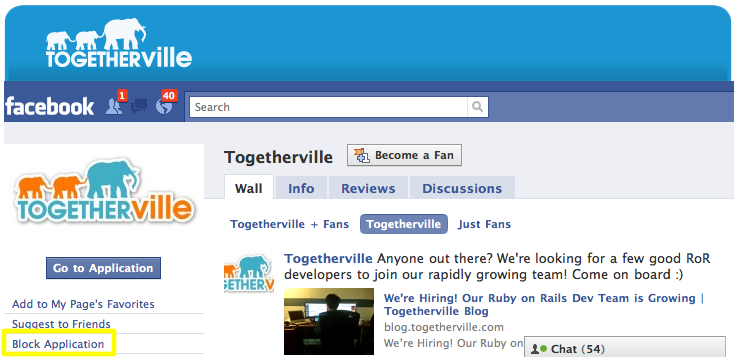
I recently stumbled across an article on Yahoo, "For Children, a Social Network With Training Wheels" (from the New York Times), about a new social networking site intended for children age 6-10 and their parents. The site, Togetherville, was created by Mandeep Singh Dhillon and according to the article, aims to " "keep children safe from cyberbullying and other online dangers while allowing them to become comfortable with online interaction". Dhillon designed the site so that it is very safe and parent/children friendly. Parents can create social circles of their friends and friends of their children, and choose which applications (games, art projects) that their children can do. Furthermore, kids can comment on their peers posts using preselected phrases.
Mr. Dhillon believes that it is important for children to develop these online social skills at an early age, as our world is becoming more and more technologically advanced. In "The Future Brain", Ray Kurzweil argues that technology is increasing exponentially, and in class, we have discussed our society as becoming more and more data driven and influenced by the media.
But is social networking for first graders appropriate and or necessary?
In the article I read, Vicky Rideout, who studied children's media use for the Kaiser Family Foundation, states, "I'm not sure what the benefit is. Believe me, kids will learn how to use technology and media when the time comes". But has the time come? At 6 years old is it important to develop online relationships and learn how to post pictures and communicate successfully on the web? After all, one could argue that it is just preparing them for Facebook and Twitter, but in a manner that is safe and controlled. But personally, I think that children should be learning how to foster real relationships with people, because interacting with humans in real life is an important skill that will be useful and needed in all aspects of a humans development. It just seems healthier for me for kids to be having playdates, playing outside in the backyard or going to the park, as opposed to sitting inside "interacting" with people online.
Image from: http://wiredpen.files.wordpress.com/2010/02/fb_togetherville_05a.png
This comment has been removed by the author.
ReplyDeleteI think it's not a very new thing. Children’s playsites or other forms of social networking have been around for kids to use for a long time, in a lot of different forms.
ReplyDeleteThe fact that there are preselected phrases is interesting, and bugs me. I think that's too limiting, to the point where it might foster feelings of security on the internet, but not actually foster any communication skills or sense of realism-- you can't learn to communicate better in one online area vs. another without trying it for yourself. I don't think it should be considered an entirely safe process, in some ways. You observe, you post, you get whatever response you get, you alter the way you post, etc. This restricted social networking just seems like a bad idea. First graders would probably find it boring, in many ways, only temporarily drawn in by their actual friends, the games and art projects. But there are better web sites for all of those activities where you can do and say more, with privacy, so it would quickly lose its appeal. Again comes up the idea of self-regulation vs. external regulation—if you’ve got some online guy trying to ‘protect the children’ by approving what they can and cannot say, there is only adult-regulated play. The idea of creating online accountability is interesting, but I don’t think it comes from parents, although parents can perhaps be helpful by giving some sort of guidance related to online communication in general.
And recalling the dana boyd blog post, I don't think kids opt to use social networking instead of playing outside with others. I think people tend to only do it in addition to hanging out with friends/having play dates, or use it for similar functions. It’s still not that productive compared to playing outside, perhaps, but I don’t know how much can be done about that. However, I would object to kids that age using that specific social networking site—if they’re going to do something online, they should do it somewhere else.
Oh, I love this: “Togetherville provides an online experience with real people you know and trust…and a parent-controlled friends list. “
A parent-controlled friends list? Makes you wonder who the web site is for.
Haha i agree with you on that, sounds to me like its more for the parents in that regard... because seriously, kids can do all of that stuff (games, art projects, chatting with preselected words) on club penguin or other websites. And I think that with regards to the internet, it is necessary for adult regulation for safety issues, but when you bring up adult-regulated play, I think that children will be able to be much more creative and learn how to develop and interact in a real setting without such tight regulations
ReplyDeleteIt's a potent issue, Katie. Schools are now posed with that same dilemma. Do we unblock sites like Facebook so to better teach our students "digital citizenship"?
ReplyDeleteI think your point about the young kids using this site as "training wheels" is well-taken. Who runs sites like these? Corporations? Well-meaning parents? Might be worth finding out to enrich this post.
It's a potent issue, Katie. Schools are now posed with that same dilemma. Do we unblock sites like Facebook so to better teach our students "digital citizenship"?
ReplyDeleteI think your point about the young kids using this site as "training wheels" is well-taken. Who runs sites like these? Corporations? Well-meaning parents? Might be worth finding out to enrich this post.